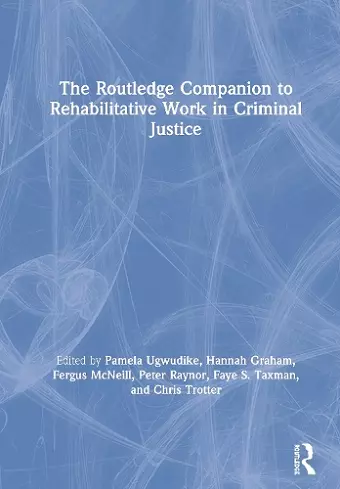The Routledge Companion to Rehabilitative Work in Criminal Justice
Fergus McNeill editor Faye S Taxman editor Chris Trotter editor Peter Raynor editor Hannah Graham editor Pamela Ugwudike editor
Format:Hardback
Publisher:Taylor & Francis Ltd
Published:19th Sep '19
Currently unavailable, our supplier has not provided us a restock date
This hardback is available in another edition too:
- Paperback£49.99(9781138103320)

All the world’s criminal justice systems need to undertake direct work with people who have come into their care or are under their supervision as a result of criminal offences. Typically, this is organized in penal and correctional services – in custody in prisons, or in the community, supervised by services such as probation. Bringing together international experts, this book is the go-to source for students, researchers, and practitioners in criminal justice, looking for a comprehensive and authoritative summary of available knowledge in the field.
Covering a variety of contexts, settings, needs, and approaches, and drawing on theory and practice, this Companion brings together over 90 entries, offering readers concise and definitive overviews of a range of key contemporary issues on working with offenders. The book is split into thematic sections and includes coverage of:
- Theories and models for working with offenders
- Policy contexts of offender supervision and rehabilitation
- Direct work with offenders
- Control, surveillance, and practice
- Resettlement
- Application to specific groups, including female offenders, young offenders, families, and ethnic minorities
- Application to specific needs and contexts, such as substance misuse, mental health, violence, and risk assessment
- Practitioner and offender perspectives
- The development of an evidence base
This book is an essential and flexible resource for researchers and practitioners alike and is an authoritative guide for students taking courses on working with offenders, criminal justice policy, probation, prisons, penology, and community corrections.
"Giving those who offend the opportunity, the resources, and the support to become better people has always seemed the most ethical of penal aims, but in insecure and turbulent times it has invariably been the hardest to defend and sustain. Historically, not all that has been done in rehabilitation’s name has been wise, kind, or effective and it has long needed the sort of critical friends it finds here to ensure that in both theory and practice it is aligned with human rights and goes beyond merely meeting criminogenic needs. Never before have the philosophical, political, and empirical arguments in its favour – and the numerous unresolved tensions in debate about them – been brought together as comprehensibly as they are in this welcome collection. It sets out all the models of good practice and identifies the contexts and cultures in which they are likely to thrive. It faces up squarely to the moral and practical challenges that champions of rehabilitation will always face, including the new technological ones. It makes a better world possible."
Mike Nellis, Emeritus Professor of Criminal and Community Justice, University of Strathclyde, UK
"Providing effective rehabilitation is a critically important function of the criminal justice system. Significant advances have been made but are hard won, and require careful attention to matching interventions to needs. At the same time, reforms are often compromised by political considerations and resource constraints. This admirable collection by a range of leading scholars and practitioners provides the reader with an up-to-date map and assessment of contemporary theories and practices to help them navigate this complex area, and understand how to choose or implement effective solutions."
Dr Stuart Ross, School of Social and Political Sciences, University of Melbourne, Australia
"This collection of essays brings together an impressive group of authors to push forward knowledge and thinking on processes of desistance and rehabilitation."
Stephen Farrall, Research Professor in Criminology, College of Business, Law and the Social Sciences, University of Derby, UK
"The history of punishing crime is intimately tied to the concept of rehabilitation – or the process and potential of reforming people who break the law into law-abiding citizens. Across time and place, academics and practitioners have debated if rehabilitation through criminal justice interventions is possible and whether it ought to be one of the core goals of punishment. The Routledge Companion to Rehabilitative Work in Criminal Justice provides a fresh international and cross-disciplinary look at these questions, considering rehabilitation and desistance from the perspective of researchers, practitioners, and people experiencing criminal justice contact."
Michelle Phelps, Assistant Professor of Sociology, University of Minnesota (Twin Cities), USA
ISBN: 9781138102057
Dimensions: unknown
Weight: 2592g
1232 pages